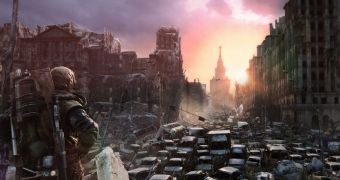Metro 2033 was a pretty weird game but video game publisher THQ managed to make a good bet by taking the 4A Games developed title and pushing it to the Western market so the company is pushing that bet further with the newly announced Metro: Last Light.
[ADMARk=1]At the E3 2011 THQ stand Last Light is one of the stars, getting the special treatment alongside games like Saints Row: The Third, Space Marine and Darksiders II, and it seems that the team working on the experience is also more concerned with the presentation of the game and the way it transmits its feelings and concepts.
The presentation of the Last Light demo is made in the mock up of a metro station, complete with turnpikes (which bear the markings of a New York producer, ironically) and the game looks fairly impressive, especially given the early stage of the development process.
The team at 4A Games have pushed the Metro experience forward when it comes to the graphics, especially the lightning, and the game looks much better, with light actually guiding the player around the important areas of the game and light management one of the most important elements of the stealth and the combat systems.
The fact that the presentation begins with a beautiful slow shot of the Moscow surface, complete with mutants and a nicely destroyed church, suggests that the game might visit the city more, perhaps in order to uncover more secrets about the nuclear winter and how the events leading up to it unfolded.
And, speaking of mutants, it seems that fighting them, in new incarnations, will be one of the highlights of Metro: Last Light, with the one shown able to move around the environment quickly to corner the players while also shrugging off most hits from the weapons used.
Metro: Last Light also aims for more atmosphere than its predecessor and the looks of the game has been redesigned to make it easier to read the combat and the resources that the player can use.
The only concern I currently have about the game is that it might rely a bit too much on scripted sequences to push the game forward, breaking the immersion in the process.

 14 DAY TRIAL //
14 DAY TRIAL //